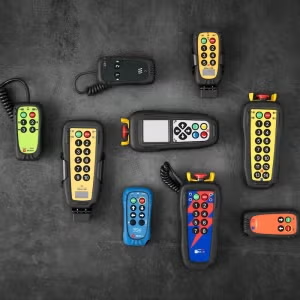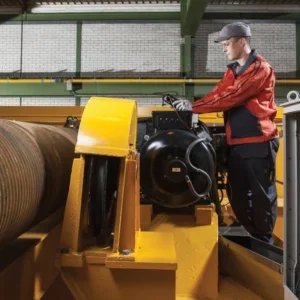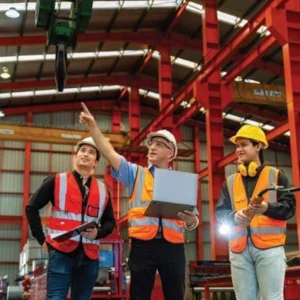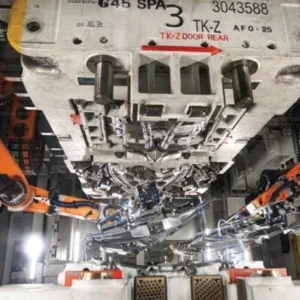US President Donald Trump has never stuck to the traditional presidential script; indeed, his unconventional approach to campaigning and orating was one factor in his unexpected success at the 2016 election.
In his time as president, Trump has continued in the same vein of unpredictable decisions, both at home and regarding international relations.
While the success or otherwise of his policy-making and statesmanship will be proved in the fullness of time, for the moment the US market is steadily growing, albeit with occasional stutters during periods of uncertainty.
“We’ve seen fairly consistent growth, with a slight pause that accompanies economic uncertainty,” says Jeff McNeil, marketing manager at Gorbel. The uncertainty in question was the introduction of the steel tariff introduced by Trump, designed to encourage manufacturers to buy steel produced in the US, by charging a tariff on imported steel. The end result, however, was that US steel manufacturers understandably increased their prices in line with the general increase.
“A week after introducing the tariff, the US government exempted some countries,” explains McNeil. “This uncertainty causes some investments to be put on hold, and therefore the whole supply chain stops.”
Whatever the underlying effects of Trumponomics, the lifting equipment industry is steadily growing, and a number of interesting innovations were on show at Modex, which took place in Atlanta, Georgia in early April.
While there were no large-scale hoists on display, the focus was on incremental improvements to established technologies.
McNeil at Gorbel introduced all the features and benefits of the company’s CraneBrain 3D software, a graphic configurator used by distributors, primarily, to work with end users in calculating the best crane or cranes for their facility and operations.
The software, which is compatible with both Windows and Apple platforms, was first launched last year at the Promat exhibition in Chicago, but has since evolved and now has the capacity to include obstacles in the calculations, such as machinery and support pillars, and to work with multiple cranes in the same facility.
Watching the software in action is impressive; not only does it appear very intuitive to use, with the dimensions of the cranes and obstacles altered at a touch, it also completes engineering calculations in real time, explains McNeil, so users can check straight away what is and isn’t possible. It also helps distributors and end users to visualise the potential solutions straight away, rather than waiting for technical drawings, adds McNeil.
Columbus McKinnon promoted its Lodestar VS, a variable-speed hoist with a software interface suitable for Windows PCs and tablets. The software was developed in-house and enables operators to connect via a port on the hoist that links to a USB input on these devices.
Maintenance information can then be accessed, such as voltage spikes, overload data and more, which assists preventative maintenance. The hoist’s parameters can also be altered using the software interface, such as speeds, limits and soft limits—and the software can be configured on any Windows system to suit the uses and preferences of each individual operator.
Also on show was Columbus McKinnon’s Lodestar, a three-phase hoist with capacities up to 2t in single line and 3t in triple line, and the Shopstar, a single-phase hoist with capacities from 250lbs to 1,000lbs.
Chinese company JB Lift is in the process of receiving a US patent for its Smart Hoist system, which is already patented in China. The hoist features a real-time load display on the unit, records the maximum load carried by the hoist, and includes an overload alarm. All of this helps to improve safety and safe operation, and with predictive maintenance, says director Steve Gao.
It can also help managers to decide if a hoist should be upgraded, if, for example, it is regularly being used at more than the recommended capacity.
The company is currently setting up a stock of its products in Chicago, and is also looking into applying for patents in the European market, adds Gao.
ALTERNATIVE LIFTING
As well as developments for conventional hoists, the market for other lifting and handling equipment continues to innovate. Modex was the first trade show for TAWI’s Lift and Go unit—essentially, a forklift with a vacuum-handling system incorporated in the top of the machine.
This enables items too large to be safely handled manually to be first transported across a warehouse, then positioned using the vacuum lifting attachment.
The innovation followed demand from customers for a mobile system, explains TAWI, and is based on the previous incarnation of the system, which had a moveable base.
The company originally developed equipment for lifting boxes, then moved to handling systems for bags, and moved forward from there. The company also supplies a range of attachments for lifting different items, with capacities up to 600lbs— the Lift and Go currently lifts up to 175lbs.
TAWI also produces monorails, as well as its own cranes, including jib cranes, gantries, free-standing units, and ceiling suspended systems.
Sky Hook produces a range of lightweight jib cranes and other lifting equipment, and promoted its articulating arm system, comprising both base and crane and featuring two points of rotation, says the company’s VP design Thomas Christensen. The company’s cranes can be fitted to a bench mount, floor mount, or mobile cart mount, in which the load rests on the trolley—and each crane can be switched between different base mounts.
The company also produces custom designed under-hook devices, including the Custom Roll Lifter, a roll handling device. The system, which was on show at Modex, has been produced for a few different customers by Sky Hook, says Christensen, and due to its continued popularity will soon be added to the company’s portfolio as a standard product.
Other innovations from the company include a double-handle crank, which is typically fitted to cranes in the 300lbs- 500lbs capacity range, and makes manual operation easier, and the streamlined clutch brake design, a standard feature of systems in the company’s Premium line of products.
The clutch brake is positioned inside the gearbox and is used as an alternative to the economy friction brake, simplifying operation. The Premium range, which also meets CE requirements, was introduced just after last year’s Promat show and is now the company’s most popular range.
Tri-Motion promoted its single-mount air hoist, first launched around 18 months ago. The system was previously attached to the the rail on two mounts, but was altered to reduce the amount of space required.
“There are always headroom issues,” says Oliver Van Keuren, vice president at the company, who adds that the size of the hoist has also been reduced to 8in.
The benefits of Tri-Motion’s systems include the speed of operation, and the very small amount of air required to operatre them. Typical lifts completed by the hoists cover loads from 10lbs to 500lbs, with an average of height of around 6ft.
The load can be moved manually, and will ‘float’ when not being moved. Pendant controls are available for bigger loads, with one customer recently ordering 450 of the systems for its operations.
“Manufacturing is good,” says Van Keuren, “but we don’t want it to grow too fast, as otherwise people can’t keep up.”
Tri-Motion also sells the LoadHalt G-Guard load arrestor, manufactured by UK company Globestock Engineering.
Tri-Motion has been selling the system for around eight years, which features an indicator to show when it has been used.
Piab was also in attendance at Modex, promoting its suction cups for vacuum lifting systems, and its ergonomic handling division Vaculex. Piab acquired Vaculex, a manufacturer of ergonomic vacuum lifters, around 18 months ago to provide a one-stop material handling solution for customers.
Recent developments include a bigger tube for higher-capacity lifting and a range of modular attachments. The company also sells cranes from Gorbel for a complete ergonomic handling package, as illustrated by the Gorbel crane at their stand at Modex, fitted of course with a vacuum lifting system.
Market Growth
Harrington Hoists introduced its new EQ/SEQ electric chain hoist line-up to the US market around ten months prior to Modex, says director of business development Jason Said, and sales have been “tremendous”. The EQ/SEQ hoists are the first hoist line-up to be offered with standard VFD control in both single and three phase configurations, says Said.
The use of VFD rather than contactors provides more precise positioning, and less wear on brakes, because as the VFD slows the load gradually before stopping, there is less jog. The hoist is suitable for loads of 1t and under.
Harrington Hoists, a distributor of Kito products, also now supplies below-thehook equipment including lifting beams and spreader beams, following the acquisition of Peerless Industrial Group.
“We can now supply cranes, hoists and below-the-hook equipment, as well as offering load testing,” says Said. “Our hoists are manufactured in Pennsylvania, where we have doubled the size of our facility over the last six months.
“We’re investing heavily. In North America we had a record fiscal year 2017. Hoist demand is up, bookings are still strong, and we want to be able to meet demand.
“There’s been a lot of reinvestment, and a general increase across the sectors we supply, including light- to mid-range improvements in markets such as coal, and oil and gas.”
The company has recently been working on integrating new computer software, which is being installed across Kito and all of the Japanese company’s subsidiaries, to enable all the operations to connect globally and share resources.
Cervis showcased its Warrior range of wireless radio remote controls for overhead cranes and hoists. The expanded product line includes three motion two-speed and two-motion, two-speed controls at the entry level price point, and offers features such as detent and stepless levers that allow stepped and proportional switching for speed control. The Warrior product line is designed to provide reliability and durability coupled with flexible configurations and world class support.
“We now have a full product range, both engineered and pre-engineered systems,” says Keith Stauffer, southeast territory manager at Cervis. “It’s fully supported by our network of (sales) engineers.
“Our next product release will be an industrial handheld Warrior control with 8 and 12 push two and three step push buttons—we’re set to begin production of that product in the third or fourth quarter of this year.
“There’s been a cycle of improvement, and good activity in the market. That’s not just in material handling sectors but we are also supplying sectors such as mining. We’re continuing to invest in our technology and staff.”
Irwin Car and Equipment, a manufacturer of crane wheels and assemblies, sheave wheels and material handling equipment has experienced a positive run over the last two to three years, says David J. Fitzpatrick, senior vice president of the Industrial Sales Group at the company, and the pace of business continues to improve.
“Our business continues to get stronger—we supply numerous OEMs as well as the after-market in all aspects of crane mobility solutions. We’re serving lots of different sectors, including the steel, forging and aluminum industries. In recent years we’ve also been capitalizing on opportunities in cargo ports, shipyards, aerospace and related markets.
“Our biggest advantages are short lead times, competitive pricing and domestically produced products in Irwin, PA, with 126 years of engineering expertise to help our customers solve their material handling problems.”






